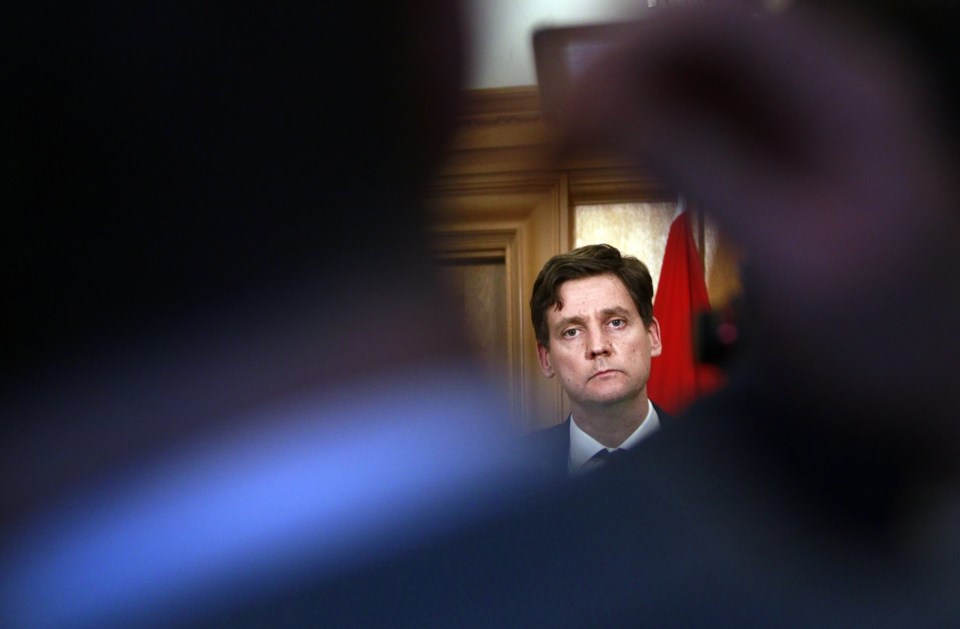VICTORIA — First Nations leaders are calling on B.C. Premier David Eby to immediately "kill" two pieces of legislation that would fast-track projects in response to U.S. government tariffs, with one leader saying they could take the government to court if it presses ahead.
Robert Phillips chaired a meeting between First Nations leaders and Eby to discuss the bill that resulted in a statement from the leaders on Thursday saying they were "deeply disappointed" with the premier's refusal to withdraw the bills.
"We are in a position where our backs are against the wall and we are going to have to respond accordingly," said Phillips, a member of the First Nations Leadership Council and First Nations Summit Political Executive.
Asked about likelihood of litigation, Phillips said it was going to be a "close call."
Phillips also pointed to other possible responses if government does not back off from the bills that First Nations say represent unilateralism and a step back on reconciliation.
"You could see direct action," Phillips said. "(When) I say direct action, I don't necessarily mean protest, but maybe protest. All of this is on the table because the premier is not backing off."
Bill 14 is aimed at streamlining permitting for renewable energy projects, such as wind farms, while Bill 15 would accelerate public and private infrastructure projects.
Phillips said First Nations leaders are dismayed, surprised and very upset about the actions of a government with which First Nations are usually "very friendly."
Grand Chief Stewart Phillip of the Union of British Columbia Indian Chiefs said in the post-meeting statement from the leadership council that "unilateralism is not acceptable."
"The province is saying ‘trust us’ and that they won’t misuse the unfettered power these bills provide; however, considering the bills were created without consultation and co-operation and that the province continues to refuse any amendments, it is unclear what this trust would be based on," he said.
He said the proposed legislation undermined the future of reconciliation in B.C. and fast-tracking the bills would set the "stage for bigger fights" between First Nations and government.
Terry Teegee, a B.C. Assembly of First Nations regional chief, said in the statement he strongly condemned the government's "unilateral and regressive" approach to drafting the bills.
Eby said in a statement that the conversation with representatives from the First Nations Leadership Council was productive, respectful and at times "frank."
He added that his government is committed to reconciliation.
"I committed that a private project proposed would not proceed through the faster processes outlined in this (bill) without the consent of the Nation whose core territory the private projects is on," Eby said.
Eby said both sides agreed to continue their conversation, but said the government would move forward to speed up schools, hospitals and "projects of provincial significance" for the benefit of all communities.
Phillips, who described himself as "probably the most pro-business person" on the leadership council, said he understood the economic rationale for speeding up projects against the backdrop of American tariffs.
"We all agree we need public hospitals, we need public schools, we need infrastructure," he said. "But when you talk about major projects that potentially could run roughshod over Aboriginal rights and title and treaty rights, that is a definite problem," he said.
B.C.'s Infrastructure Minister Bowinn Ma meanwhile said in the legislature that the government "made an error" in not adequately consulting First Nations on Bill 15.
Opposition Conservative Leader John Rustad renewed his call for the government to withdraw the legislation to allow for proper consultation.
"David Eby seems hell bent on just wanting to say, 'it's my way or the highway,'" Rustad said.
B.C. Green Party member Rob Botterell said his party opposed Bill 15 for a range of reasons, including the lack of consultation with First Nations.
"It's a very broad piece of legislation that reserves a whole ton of power and decision-making to cabinet," Botterell said.
This report by The Canadian Press was first published May 15, 2025.
Wolfgang Depner, The Canadian Press



